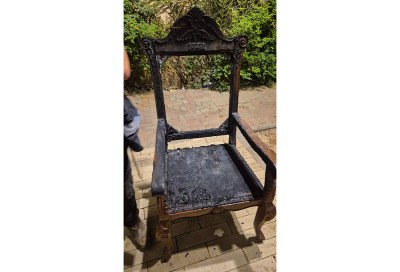



In a deeply disturbing and heartbreaking incident, the Yerushalayim synagogue and study hall of Rav Yitzchak Yosef, the Rishon LeTzion and former Sephardic Chief Rabbi of Israel, was deliberately set ablaze this past week. In the early hours of the morning, an arsonist entered the Or Habib synagogue in the Sanhedria neighborhood of Jerusalem and ignited the Rav’s personal seat.
The fire spread quickly, charring sacred sefarim—including volumes authored by both Rabbi Yosef and his late father, Maran HaRav Ovadia Yosef, zt”l. Video footage captured the assailant fleeing, and shortly thereafter, a large cross was found spray-painted on a nearby building, suggesting a hate-motivated act. Israeli authorities, including the Fire and Rescue Service, classified the incident as an intentional arson attack.
But the flames that scorched a beit midrash in Yerushalayim ignited a firestorm of anguish far beyond the physical site—especially in Queens, where the desecrated synagogue also serves as the home of Chazaq’s Kollel Ohr Aviel. That beit midrash, sanctified by the daily tefillot and Torah study of dedicated avreichim, is a spiritual bridge between the Jewish communities of Israel and the diaspora. For supporters of Chazaq, this was not an abstract attack on a distant institution—it was an attack on family, on Torah, and on the very heart of their mission.
“This is not just an attack on a building or on a specific person,” said Rabbi Ilan Meirov, Director of Chazaq. “This is an attack on Torah itself, and we all feel the pain—from Jerusalem to New York and beyond.” Rabbi Meirov, who helped establish the Jerusalem-based kollel as an extension of Chazaq’s mission to spread Torah worldwide, emphasized that the tragedy only strengthens their resolve. “We will rebuild. We will continue to shine the light of Torah even brighter both in America and in Eretz Yisrael.”
A dozen avreichim learn daily at Kollel Ohr Aviel, their voices of Torah once resonating through those now-charred halls. In recent years, this kollel has become a point of pride for the Queens Jewish community, drawing spiritual strength and connection to Eretz Yisrael. The image of Rabbi Yosef’s scorched seat—where so many shiurim were delivered—has become a painful symbol of the desecration, yet also a rallying cry for resilience.
The emotional toll of the attack was felt most intimately by Rabbi Yosef’s family. His brother, Chief Rabbi David Yosef, who also serves as Nasi of the Beit Din HaGadol, responded with pain and clarity: “I heard with great pain about the severe incident in my brother’s synagogue—where his seat was set ablaze, his books were burned, including works of our father Maran. We must all condemn this and stand united in honoring the sanctity of our batei knesset.”
National leaders across the religious and political spectrum condemned the act. Israeli President Isaac Herzog decried the attack as a “serious hate crime,” while Prime Minister Benjamin Netanyahu called for swift action against those responsible. Shas party leader Aryeh Deri described the arson as “a hate crime of the highest level,” linking it to an alarming uptick in incitement against religious Jews. Additional condemnations came from Minister of Religious Services Michael Malchieli, Interior Minister Moshe Arbel, and even Sheikh Muwafaq Tarif, the spiritual leader of Israel’s Druze community, who publicly expressed solidarity with the Jewish people.
The suspect—a Jewish man in his twenties—was apprehended two days later in a joint operation by the Shin Bet and Jerusalem District Police. Although his motives have not been officially disclosed, early reports suggest the attack may have been ideologically driven, possibly influenced by mounting tensions over Haredi military exemptions and broader social divides. A court-imposed gag order currently restricts the release of further details. His detention has been extended as police continue to assess whether the cross graffiti and the arson were part of a broader campaign or the act of a lone extremist.
Following the attack, the Shas party arranged private security for Rabbi Yosef and the building, and the Knesset is expected to review measures to bolster synagogue security across the country. For Chazaq and the Queens community, however, the response has been immediate and deeply personal. Already, plans are being discussed to restore the damaged beit midrash and replace the destroyed sefarim. Fundraising efforts are being coordinated quietly, and Torah study continues—undaunted and undeterred.
In a time of increasing societal division, this act of destruction has galvanized calls for Jewish unity. “The pain is real,” Rabbi Meirov shared, “but so is our strength. Torah was attacked, so we respond with more Torah.” The singed remains of Rabbi Yosef’s chair may stand as a chilling image of desecration—but they are now also a symbol of resolve. From Jerusalem to Queens, the message is clear: We will never allow the fire of Torah to be extinguished.
Additional Reporting By Shabsie Saphirstein
Arson Attack At Rabbi Yitzchak Yosef’s Shul In Yerushalayim Sends Shockwaves To Queens Community & Beyond
Typography
- Smaller Small Medium Big Bigger
- Default Helvetica Segoe Georgia Times
- Reading Mode




